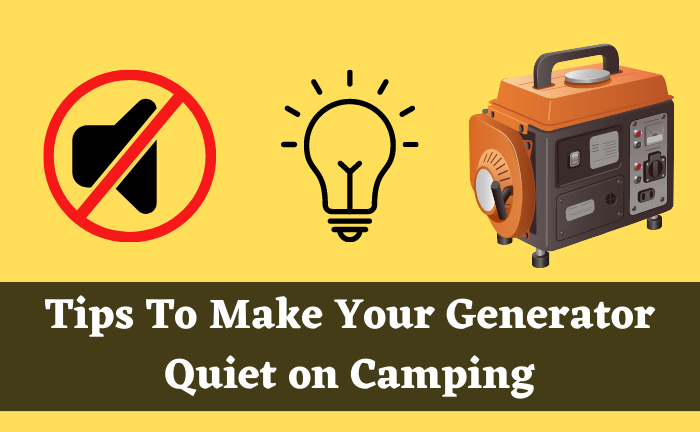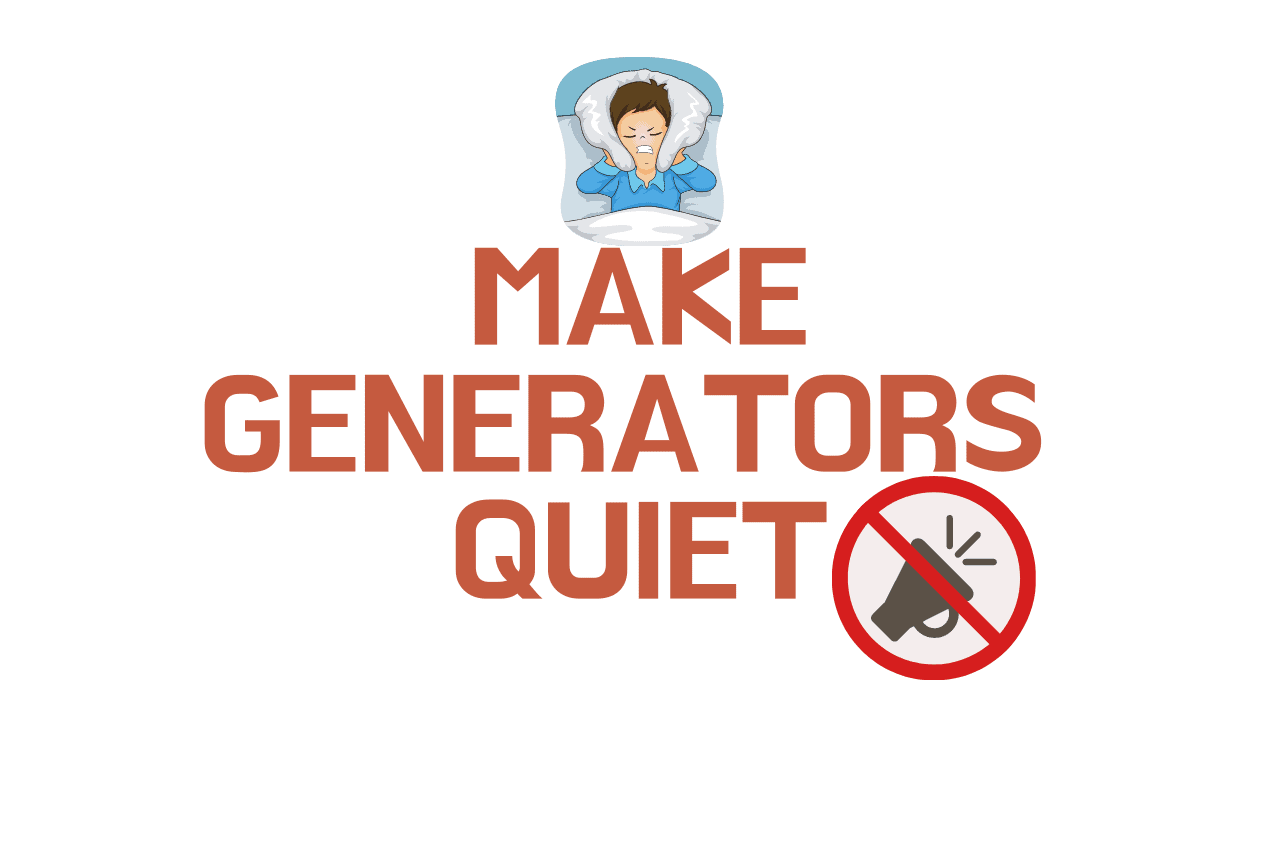You’ll find many downsides while using generators, including the inconvenience to carry them everywhere and the fuel systems but the most recurring problem that most campers face is the loud noise of generators. But now the issue is resolved as our experts have gathered how you minimize the voice of generators.
Usage of foam underneath or silencer, choosing the right sized generator according to your needs, and many other tips will help you to quiet your generator.
Table of Contents
Quiet a Generator For Home

Every problem comes with a solution, so the noisy system of the generator is also available with many solutions to make it quiet. You don’t have to worry if you’re frustrated with the noise of generators at your home. After a complete analysis of tips, we’ve come up with the handiest tips. Explore them as below.
Adjust the position of Exhaust System
The primary reason for the loud noise of generators is their alignment and the exhaust system. The engine of your generator is the part that is responsible for making unbearable voices. So the best way to deal with such complications is to point the exhaust system away from your living area.
The direction of the exhaust system in the upward position will make it to distribute the voice equally in the whole environment. Another best way is to point the pipelines of the exhaust system in an upright manner. This trick will not, however, end up in making your generator completely silent but somehow will help in minimizing the noise.
Use a Soundproof Box
A box that not only holds in the voice of your generator but also acts as a storage space can be the best choice if you’re looking for dealing with the voice of generators. Keeping your generator out of your house can put you in danger because of the chances of stealing. You can make a soundproof box for tackling this problem.
One of the best choices is to go for the fire insulating materials for manufacturing a storage box for generators. Ventilation is the first and the foremost factor to keep in mind while buying or manufacturing the box as carbon monoxide can lead to disastrous exhausts.
Another thing you can do as a permanent solution is to use the partitions specialized for sound cancellation. This will aid you in moving your generator all around your house very conveniently.
Keep Your Generator in a Shed
The recommendation of usage of a shed for keeping the voice of the generator low offers some inconveniences, but there’s nothing wrong in trying it if you have got an empty shed around your house. Two most disastrous factors related to generators include the emission of harmful gases that bring the worst to your health. You can cope up with these hazards by keeping your generator in a shed at a small distance from your house.
Make sure about the adequate availability of airflow in the shed. Moreover, you should also check for the installation of acoustic panels in the walls – the best alternatives to absorb all voices into the wall.
Utilize the Water Bucket
Using a bucket of water to dampen the voice of generators can be surprising. Believe us; it can be the best trick you can apply for lowering the voice of generators. The exhaust pipes emit smoke and cause loud noise. You can end this frustration by putting the exhaust pipe of the generator in a bucket full of water (about 5 gallons of water).
A thing you may be concerned about is the exposure of water in the pipe, don’t worry, make small holes at the place of the highpoint of the exhaust pipe. This will resolve the concern of protecting your generator from water.
Use a Sound Deflector
Deflecting the sound of a generator all around the space where it’s placed can minimize the voice of your generator. You may have heard about sound deflectors in many cases, but you can also try it in the case of generators. Buy a device that can distribute the voice of a generator from a specific area, thus lowering the frequency of the sound generated by it.
Using a sound deflector isn’t the way to make your generator completely quiet, but it’ll hinder the sound from reaching by distracting its path. So using a sound deflector can prove as the best temporary solution for the voice of generators.
Try Out Generator Silencers
You may have heard about the gun silencers, but now generator silencers are also available in the market which can make your generator completely quiet. Combustion of fuel in generators can produce the loudest noise, but you can fit a silencer in it to reduce the sound of combustion.
The size of the generator is responsible for the extent of voice produced. That’s why silencers of different categories are available to tackle the problem of several levels of noise.
Tips To Make Your Generator Quiet on Camping

Camping can be the most exciting activity unless you run out of power. Generators can be the best alternative to charge your phone or other electrical devices. However, portable generators for RV or camping produce several decibels of sound, but you’ve to make it quiet completely to save the environment.
So without further discussion let’s head towards the tips you should follow on camping.
Insert a Soft Padding Underneath the Generator
The friction offered by the surface to the generator also adds to the increase in the voice of the generator’s engine. The greater the number of vibrations transferred into the rough surface, the greater will be the voice of the generator. You can prevent this inconvenience by placing your generator on soft padding or choose a bare area for placing it.
The purpose of placing soft padding underneath the generator is to provide it with an anti-vibration mount. The addition of a rubber pad at the bottom side will decrease the number of vibrations, thereby ending up in lowering the voice of generators.
Choose the Generator According to Your Needs
The size of the generator is responsible for the extent of the voice it gives out. One of the best solutions to cover the sound problem is to grab your hands on the generator, which fits your needs. Buying a generator that is too big, excessive than your needs is something like welcoming uneasiness by yourself. The best way to deal with this problem is to get a complete idea about power needs. After analyzing the requirements, you can choose the best option with minimal voice production.
If you’re on a road trip with an RV, you’ll probably need minimal power plug-ins just for charging your phone and other essentials. A small-sized portable generator is enough for these little tasks. But most often people face problems in running their refrigerators or the heating system, so in such cases, you’ve to choose a generator with a power range of about 2000-5000 watts.
Manufacture an Enclosure Box for Generator
Acoustic boxes are the best alternatives when it’s talked about making generators quiet on camping. An acoustic box can act as an insulation box for keeping all the sound of the generator within the box, thus resulting in lowering the decibels of the sound produced by the generator. You can manufacture the baffle box by yourself or you can buy it from the market.
Another best part for applying this trick is that the baffle box is that it’s quite portable to carry on your RV without any hustle. This feature of portability has made the mind of many users implement this trick for lowering the voice of generators.
Adopt the Method of Plywood Board
In case you’ve tried the tricks, and still, the problem is the same, you can go for the plywood boards. By adding plywood boards to the alignment of your generator, you can make it quiet. The hard surfaces play the leading role in hindering voice transmission. It does so by reflecting the sound waves away from the free surfaces of the board.
All you’ve to do is to get some slightly larger-sized plywood boards than your generator. Place them around the generator in the form of a box. Make sure that there’s no space left to let the voice go out of the insulation. This alignment of plywood boards around the generator will result in managing the exposure of sound with the open areas.
Change the Muffler of Generator
As the name indicates, a muffler is specialized to muffle the voice no matter whether of a generator or any other device. The majority of the generators come with exhaust pipes which are associated with mufflers. The purpose of inserting them into the exhaust pipes is to minimize the sound effect in the loudest part of the generator.
No doubt some generators come up with the pre-installed mufflers, but if still, the generator is producing voice, you need to replace it with a new one. The decision of changing the muffler is quite fruitful as it results in decreasing the sound production of the generator by 10-12 decibels. But the thing that’s going to test you is the right size of muffler that fits your generator. You can approach a mechanic to solve this problem for you.
Generate a Sound Wall Around the Generator
In similarity to plywood, the option of building up a sound wall around the generator will make it easy for you to overcome the problem of the considerable noise of a generator. If you’re searching for a permanent method for making your generator quiet, the choice of cinder block over other options can be the wisest decision you’ll make.
Doubtlessly generators can make your RV trip quite memorable by giving you convenience in all means unless you turn it on for energy production. You can create a complete pack of the cinder blocks in the manner you’d created the acoustic box. Make sure to build the box higher than the generator so that it traps the voice most efficiently. Don’t mess with the position of the generator and the cinder blocks; otherwise, it’ll not work at all.
Put a Rubber Flap on the Top of Generator
Don’t worry if you don’t have the potential to generate a baffle box on the spot. A rubber flap is a pretty good choice to get rid of the noisy generators. If covering the generator with a baffle box or plywood isn’t yielding the result, you can add rubber flaps on the top side to make the sound of the generator quite bearable.
After constructing a baffle box, you can increase its efficiency by adding another layer of rubber flaps on its lower side. In this manner, the inner surface of the generator will act as a way to keep the generator quiet. Another thing to keep in mind while purchasing the rubber flap is the presence of qualities like heat-resistant and consistency to hinder the voice from running out of the box.
What Are the Causes for Large Noise of Generators?
Getting disturbed by the unusual noise of a generator is normal. Still, you’ve to get a complete idea about the factors that are responsible for making a generator to produce loud sounds. Let’s discuss some of these factors as below.
Size of the Engine
The first and foremost factor that is responsible for the unbearable voice of the generator is the build of the engine. Large-sized generators are believed to produce greater voice as compared to small-sized generators. We’ll recommend you choose a generator under the power range of 4000 watts if you want to stay away from punching voices.
Position of the Generator
The way you place your generator matters a lot. The surface on which you’ve placed it is responsible for enhancing the impact of vibrations. Mostly a rough and rocky surface can cause a generator to sound loud.
READ MORE: Who Makes Durostar Generators?
Final Words
No doubt tackling the problem of the voice of generators is quite cheesy, but the above tips can make it easy for you. If you want to cover the power deficiency with the quiet generators, give a read to the tips mentioned above.

